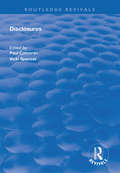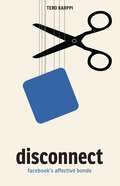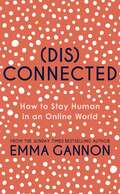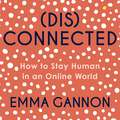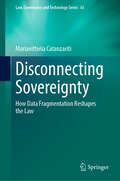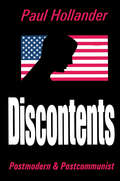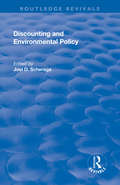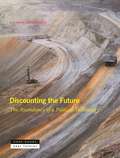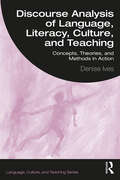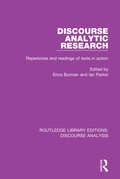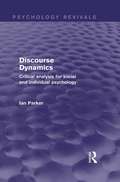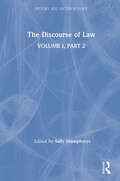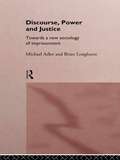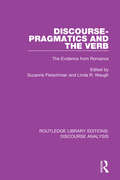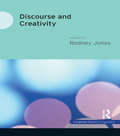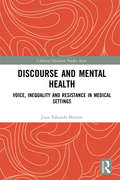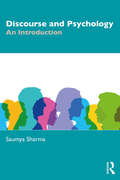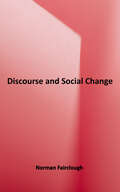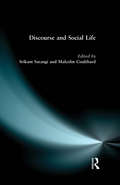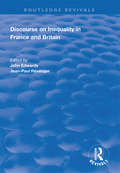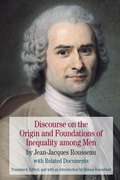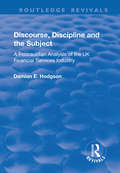- Table View
- List View
Disclosures (Routledge Revivals)
by Paul Corcoran Vicki SpencerPublished in 2000. Disclosures occur at every level of human experience; a slip of the tongue, intentional betrayals of confidences, carefully worded affidavits, intimate avowals of passion, confessions, or exposes, of our most deeply hidden secrets. This book is the first detailed study of the term disclosure, as it resonates in its many connotations. To our eyes all things are either covered or uncovered, hidden or revealed, clothed or naked, seen or unseen. Disclosure and closure, as they are explored in these pages, are not simply oppositions but alternate moments in a process of communication. By unravelling the kinds and levels of disclosure existing in language games of different communitive contexts, this book is, itself, a revelation. It is a scholarly and illuminating study of the pervasiveness of disclosures in interpersonal, moral, cultural and political terms from the ancient times of Athenian democracy to contemporary society.
Disconnect: Facebook's Affective Bonds
by Tero KarppiAn urgent examination of the threat posed to social media by user disconnection, and the measures websites will take to prevent it No matter how pervasive and powerful social media websites become, users always have the option of disconnecting—right? Not exactly, as Tero Karppi reveals in this disquieting book. Pointing out that platforms like Facebook see disconnection as an existential threat—and have undertaken wide-ranging efforts to eliminate it—Karppi argues that users&’ ability to control their digital lives is gradually dissipating. Taking a nonhumancentric approach, Karppi explores how modern social media platforms produce and position users within a system of coded relations and mechanisms of power. For Facebook, disconnection is an intense affective force. It is a problem of how to keep users engaged with the platform, but also one of keeping value, attention, and desires within the system. Karppi uses Facebook&’s financial documents as a map to navigate how the platform sees its users. Facebook&’s plans to connect the entire globe through satellites and drones illustrates the material webs woven to keep us connected. Karppi analyzes how Facebook&’s interface limits the opportunity to opt-out—even continuing to engage users after their physical death. Showing how users have fought to take back their digital lives, Karppi chronicles responses like Web2.0 Suicide Machine, an art project dedicated to committing digital suicide. For Karppi, understanding social media connectivity comes from unbinding the bonds that stop people from leaving these platforms. Disconnection brings us to the limit of user policies, algorithmic control, and platform politics. Ultimately, Karppi&’s focus on the difficulty of disconnection, rather than the ease of connection, reveals how social media has come to dominate human relations.
Disconnected: How to Stay Human in an Online World
by Emma GannonPRE-ORDER NOW: The new book by Sunday Times bestselling author, Emma Gannon I love Emma Gannon's wise and refreshing perspective on work, and more broadly on the challenges of building a meaningful life in an era of distraction, overwhelm and uncertainty. - Oliver Burkeman, New York Times Bestselling author of Four Thousand Weeks__________Millennials might have grown up online but now they want to log off. And it's not just millennials. A year of lockdowns, Zoom meetings and reduced physical contact has made us more dependent on the internet than ever before - but has it lost its humanity? Our focus on community and real connection has been sent off-course and we're becoming more aware of how the algorithm manipulates us and how our data has made us a product to be sold. So, where do we go from here and how can we get back on track? (Dis)connected examines these topics and offers tangible tips and advice for those of us who might feel a little lost right now and want to find themselves again.__________Emma Gannon is a cordial and provocative spirit. Read her, listen to her, explore her world and the world at large through her eyes. Hers is a journey well worth taking. - Julia Cameron, New York Times Bestselling author of The Artist's Way
Disconnected: How to Stay Human in an Online World
by Emma GannonMillennials might have grown up online but now they want to log off. And it's not just millennials. A year of lockdowns, Zoom meetings and reduced physical contact has made us more dependent on the internet than ever before - but has it lost its humanity? Our focus on community and real connection has been sent off-course and we're becoming more aware of how the algorithm manipulates us and how our data has made us a product to be sold. So, where do we go from here and how can we get back on track? (Dis)connected examines these topics and offers tangible tips and advice for those of us who might feel a little lost right now and want to find themselves again.(P) 2022 Hodder & Stoughton Limited
Disconnecting Sovereignty: How Data Fragmentation Reshapes the Law (Law, Governance and Technology Series #65)
by Mariavittoria CatanzaritiThis book explores the dynamic legal semantics of territory as applied to data. It offers a theoretical assessment of the legal challenges that data flows pose for the principle of territoriality and for state sovereignty more generally. The concept of sovereignty has traditionally developed in close connection with the exercise of powers over a territory, and ideas of jurisdiction have always been based on the principle of territoriality. Digitalization questions however the very idea of physical frontiers. Interconnected networks make data in effect borderless. Data can in fact be created, stored, processed, and accessed anytime and from anywhere. The idea of the book is upbeat: the law can keep pace with the ability of data to fragment reality. The condition for this is that sovereignty disconnects from territory. Disconnection is not getting rid of the territory once and for all, it only means that for data alternatives to the territorial connection exist. The analysis focuses on data from a holistic perspective (personal and nonpersonal) with the aim of investigating divergent and convergent solutions provided by different branches of the law (data protection, IP law, international law, and fundamental rights protection). It assesses in particular, the relationships between digitalization and the principle of territoriality, focusing on the specific legal aspects: the connections between law and territory; the impact of digitalization on state sovereignty; the use of extraterritoriality to circumvent territorial limitations on data flows; the rise of digital jurisdiction and its challenges; the interplay between digital jurisdiction and state sovereignty, and the alternative technological and legal solutions to data localization.
Discontents: Postmodern and Postcommunist
by Paul HollanderWhat ails people at the present time in Western and especially American society is an inexhaustible subject. Discussion of these discontents in the United States in the last decade of the twentieth century leads to an obvious question: How much and what kind of discontents are possible in a society that has experienced over a decade of economic growth, close to full employment, hardly any inflation, falling crime rates, declining teenage pregnancies, and other good things? Is there anything to worry about in a country that has become the undisputed superpower of the world and no longer faces another hostile superpower such as the Soviet Union used to be? Paul Hollander wrestles with these and other questions in seeking to understand conditions and developments within American culture and society in the context of their relationship to political systems, movements and ideas critical of the United States and Western values. Hollander examines disparate phenomena, such as the O.J. Simpson case, the banning of West Side Story in Amherst, Massachusetts, the popularity and exposu of Rigoberta Menchu, and the appeal of sports utility vehicles, which shed light on the major themes of the volume. Topics include conflicts among American intellectuals (including disputes over the Kosovo intervention), the impact of postmodernism on higher education, the persisting appeal of victimhood in American society, the flaws of American sociology, academic specialists' failure to anticipate the collapse of the Soviet Union, and the new anti-Americanism in postcommunist societies. Among topics of historical interest are a survey of Western judgments and misjudgments of the communist systems; examination of the relative neglect of political violence in communist states, and analysis of officially enforced, secular-religious cult of communist rulers. Many of these writings are linked to the author's longstanding interest in why people accept or reject particular political systems and in the contradictory human needs and desires which condition and limit the pursuit of social and political ends. Sociologists, political scientists, and the general reader will find this book of great interest.
Discontinuity in Learning
by Andrea R. EnglishIn this groundbreaking book, Andrea English challenges common assumptions by arguing that discontinuous experiences, such as uncertainty and struggle, are essential to the learning process. To make this argument, Dr. English draws from the works of two seminal thinkers in philosophy of education - nineteenth-century German philosopher J. F. Herbart and American Pragmatist John Dewey. English's analysis considers Herbart's influence on Dewey, inverting the accepted interpretation of Dewey's thought as a dramatic break from modern European understandings of education. Three key concepts-- transformational learning, tact in teaching, and perfectibility-- emerge from this analysis to revitalize our understanding of education as a transformational process. Dr. English's comparative approach interweaves European and Anglo-American traditions of educational thought with a contemporary scholarly perspective, contributing to a work that is both intellectually rewarding and applicable to a classroom setting. The result is a book that is essential reading for philosophers and scholars of education, as well as educators.
Discounting and Environmental Policy (International Library Of Environmental Economics And Policy)
by Joel D. ScheragaThis book was published in 2003.The "International Library of Environmental Economics and Policy" explores the influence of economics on the development of environmental and natural resource policy. In a series of 25 volumes, the most significant journal essays in key areas of contemporary environmental and resource policy are collected. Scholars who are recognized for their expertise and contribution to the literature in the various research areas serve as volume editors and write essays that provides the context for the collection. Volumes in the series reflect three broad strands of economic research including: natural and environmental resources; policy instruments and institutions; and methodology. The editors, in their introduction to each volume, provide a state-of-the-art overview of the topic and explain the influence and relevance of the collected papers on the development of policy. This reference series provides access to the economic literature that has shaped contemporary perspectives on land use analysis and policy.
Discounting the Future: The Ascendancy of a Political Technology
by Liliana DoganovaA pioneering exploration of the defining traits and contradictions of our relationship to the future through the lens of discountingForest fires, droughts, and rising sea levels beg a nagging question: have we lost our capacity to act on the future? Liliana Doganova&’s book sheds new light on this anxious query. It argues that our relationship to the future has been trapped in the gears of a device called discounting. While its incidence remains little known, discounting has long been entrenched in market and policy practices, shaping the ways firms and governments look to the future and make decisions accordingly. Thus, a sociological account of discounting formulas has become urgent.Discounting means valuing things through the flows of costs and benefits that they are likely to generate in the future, with these future flows being literally dis-counted as they are translated in the present. How have we come to think of the future, and of valuation, in such terms? Building on original empirical research in the historical sociology of discounting, Doganova takes us to some of the sites and moments in which discounting took shape and gained momentum: valuation of European forests in the eighteenth and nineteenth centuries; economic theories devised in the early 1900s; debates over business strategies in the postwar era; investor-state disputes over the nationalization of natural resources; and drug development in the biopharmaceutical industry today. Weaving these threads together, the book pleads for an understanding of discounting as a political technology, and of the future as a contested domain.
Discourse Analysis of Language, Literacy, Culture, and Teaching: Concepts, Theories, and Methods in Action (Language, Culture, and Teaching Series)
by Denise IvesAn essential text on discourse theory and analytic methods, this book demonstrates the possibilities of using discourse analysis to better understand language, literacy, culture, and teaching. Each chapter provides coherent, extended examples of individuals engaged in the process of doing discourse analysis. The narrative approach highlights the individual experiences of the discourse analysts and provides a unique, inside-the-mind view of the process and choices along the way. Across the book, stories describe processes involved in analyses, including identifying aims, formulating questions, selecting discourse, transcribing oral and multimodal discourse, translating discourse, chunking discourse, choosing and applying discourse and other theory, generating and supporting claims, and communicating findings. Chapters also feature sidebars with key theories and methods, recommended readings, and additional resources. This book is ideal for courses on discourse analysis, qualitative research, or language, literacy, culture, and teaching. Readers are invited to imagine the possibilities for using discourse analysis to answer their own questions.
Discourse Analytic Research: Repertoires and readings of texts in action (RLE: Discourse Analysis)
by Erica Burman Ian ParkerFirst published in 1993, this book provides clear illustrations of discourse analytic work and empirical critiques of the traditional psychological approaches. Drawing on a range of examples, the contributors argue that identity, deeply felt emotions, prejudice, and attitudes to social issues are created by the language that describes them rather than being intrinsic to the individual. In illustrating the variety of methods available through their studies of punk identity, sexual jealousy, images of nature, political talk, sexism in radio, education case conferences and occupational choice, the contributors provide a challenging presentation of discourse analysis in a psychological context.
Discourse Dynamics: Critical Analysis for Social and Individual Psychology (Psychology Revivals)
by Ian ParkerWhat are discourses? Are discourses ‘real’, and what is real outside language? In this book, originally published in 1992, Ian Parker provides one of the clearest and most systematic introductions to discourse research and the essential theoretical debates in the area. At the time it was one of the few texts to defend a realist position, discuss accounts of postmodernity and set out criteria for the identification of discourses. Discourse Dynamics is essential reading to anyone interested in project research and an understanding of the theoretical issues involved in discourse analysis. The book will also be of use to students other than those studying psychology. It addresses the concerns of all those looking at qualitative textual research in the human sciences and is still very much relevant today.
Discourse Of Law
by S. C. HumphreysFirst Published in 1985. This Volume I, Part 2 of the History and Anthropology series and focuses as Law as a discourse, including essays on disputes of locals in Eastern Brittiany on the ninth century, a British Indian dilemma when looking at property law, law-enforcement in eighteenth century England, Islamic Law in the Medieval Middle East and its social contest and silent law in context of the slaves in nineteenth century Brazil.
Discourse Power and Justice: Towards A New Sociology Of Imprisonment (International Library of Sociology)
by Brian Longhurst Michael AdlerFirst Published in 1994. Routledge is an imprint of Taylor & Francis, an informa company.
Discourse Pragmatics and the Verb: The Evidence from Romance (RLE: Discourse Analysis)
by Suzanne Fleischman Linda R. WaughFirst published in 1990, this collection investigates grammatical categories associated with the verb as they are used by speakers and writers in real discourses and texts. Focusing on tense, aspect, mood, and voice in French, Spanish, and Italian, each chapter underscores the importance of context in our understanding of how grammatical categories work. Above and beyond their basic ‘grammatical functions’, categories of the verb are shown to operate in such capacities as structuring information in discourse, establishing point of view in a text, and creating textual cohesion. Importantly, this volume reflects the crucial role discourse-pragmatics factors play in our interpretation of the meanings of categories of grammar.
Discourse and Creativity
by Rodney JonesDiscourse and Creativity examines the way different approaches to discourse analysis conceptualize the notion of creativity and address it analytically. It includes examples of studies of creativity from a variety of traditions and examines the following key areas, how people interpret and use discourse, the processes and practices of discourse production, discourse in modes other than written and spoken language, and the relationship between discourse and the technologies used to produce it.Discourse and Creativity combines a forward-thinking and interdisciplinary approach to the topic of creativity; this collection will be of great value to students and scholars in applied linguistics, stylistics, and communication studies.
Discourse and Identity
by Anna De Fina Anna De Fina Deborah Schiffrin Michael Bamberg Deborah SchiffrinThe relationship between language, discourse and identity has always been a major area of sociolinguistic investigation. In more recent times, the field has been revolutionized as previous models - which assumed our identities to be based on stable relationships between linguistic and social variables - have been challenged by pioneering new approaches to the topic. This volume brings together a team of leading experts to explore discourse in a range of social contexts. By applying a variety of analytical tools and concepts, the contributors show how we build images of ourselves through language, how society moulds us into different categories, and how we negotiate our membership of those categories. Drawing on numerous interactional settings (the workplace; medical interviews; education), in a variety of genres (narrative; conversation; interviews), and amongst different communities (immigrants; patients; adolescents; teachers), this revealing volume sheds new light on how our social practices can help to shape our identities.
Discourse and Knowledge
by Teun A. Van DijkMost of our knowledge is acquired by discourse, and our ability to produce and understand discourse is impossible without the activation of massive amounts of knowledge of the world. Both 'discourse' and 'knowledge' are fundamental concepts of the humanities and social sciences, but they are often treated separately. Based on a theory of natural knowledge, the book deals with the cognitive processes, social distribution, cultural differences and the linguistic and discursive 'management' of knowledge in interaction and communication in epistemic communities. The first book to adopt a multidisciplinary approach to studying the relationship between the two concepts, Discourse and Knowledge introduces the new field of epistemic discourse analysis. Using a wide range of examples to illustrate the theory, it is essential reading for both students and academics interested in epistemology, linguistics, discourse analysis, cognitive and social psychology and the social sciences.
Discourse and Mental Health: Voice, Inequality and Resistance in Medical Settings (Cultural Discourse Studies Series)
by Juan Eduardo BonninThis book is the result of years of fieldwork at a public hospital located in an immigrant neighborhood in Buenos Aires, Argentina. It focuses on the relationships between diversity and inequality in access to mental healthcare through the discourse practices, tactics and strategies deployed by patients with widely varying cultural, linguistic and social backgrounds. As an action-research process, it helped change communicative practices at the Hospital’s outpatient mental healthcare service. The book focuses on the entire process and its outcomes, arguing in favor of a critical, situated perspective on discourse analysis, theoretically and practically oriented to social change. It also proposes a different approach to doctor-patient communication, usually conducted from an ethnocentric perspective which does not take into account cultural, social and economic diversity. It reviews many topics that are somehow classical in doctor-patient communication analysis, but from a different point of view: issues such as the sequential organization of primary care encounters, diagnostic formulations, asymmetry and accommodation, etc., are now examined from a locally grounded ethnographic perspective. This change is not only theoretical but also political, as it helps understand patient practices of resistance, identity-making and solidarity in contexts of inequality.
Discourse and Psychology: An Introduction
by Saumya SharmaThis book presents a unique understanding of the interdependence between language and psychology and how one’s speech is shaped by and in turn shapes one’s thoughts, beliefs, and emotions. Drawing on the tenets of discourse analysis and psychology, it presents a comprehensive guide to a new and burgeoning area in linguistics and critical theory. The volume focusses on individual and group behaviour to show how identity formation is as much dependent on the psychological state as on social surroundings and context. It introduces various concepts from the sociocognitive framework, discursive and critical psychology, highlighting the myriad ways of approaching the complex interface between text, sociocultural factors, and cognitive processes. An indispensable guide to the complex world of language and the unconscious, the volume will be of interest to students and scholars of linguistics, applied linguistics, sociolinguistics, psychology and behavioural science, language, and critical theory. It is also a must-read for the general reader interested in language, communication, and social intelligence.
Discourse and Social Change
by Norman FaircloughThis book is a critical introduction to discourse analysis as it is practiced in a variety of different disciplines today, from linguistics and sociolinguistics to sociology and cultural studies. The author shows how concern with the analysis of discourse can be combined, in a systematic and fruitful way, with an interest in broader problems of social analysis and social change. Fairclough provides a concise and critical review of the methods and results of discourse analysis, discussing the descriptive work of linguists and conversation analysts as well as the more historically and theoretically oriented work of Michel Foucault. He develops an original framework for discourse analysis which firmly situates discourse in a broader context of social relations bringing together text analysis, the analysis of processes of text production and interpretation, and the social analysis of discourse events.
Discourse and Social Life
by Malcolm Coulthard Srikant SarangiThis collection brings together for the first time in a single volume many of the major figures in contemporary discourse studies. Each chapter is an original contribution which has been specifically commissioned for this book, and together they document the wide range of concerns and techniques which characterise the discipline at the turn of the century.Discourse and Social Life is concerned with a variety of different types of data - talk, text and interaction - and covers research sites which range from the home setting through the health care setting and the courtroom to the public sphere. The book not only provides a critical, historical overview of different traditions of discourse analysis, but also projects to some extent the possible developments of this field of study, as other allied disciplines (Philosophy, Psychology, Sociology, Rhetoric and Communication Studies) are taking a discursive turn. Readers are invited to draw parallels between these different approaches to studying discourse in its social context. The contributors are- Sally Candlin, Malcolm Coulthard, Justine Coupland, Nikolas Coupland, Norman Fairclough, Ruqaiya Hasan, Robert Kaplan, Geoff Leech, Yon Maley, Greg Myers, Celia Roberts, Srikant Sarangi, Ron Scollon, Theo van Leeuwen, Henry Widdowson and Ruth Wodak.
Discourse on Inequality in France and Britain (Routledge Revivals)
by John Edwards Jean-Paul RévaugerPublished in 1998, this volume consists of 16 edited papers presented at an Anglo-French conference on inequality in France in March 1997. The purpose of this book is to bring together ideas and perceptions of inequality in the two countries across several areas including multi-ethnicity, education, social work, housing and health, presented by experts in these fields and in cultural studies. The purpose is not comparative in the traditional sense, but rather to analyze the different meanings amd conceptions that apply to inequality in France and Britain and to demostrate how these differences affect policies as well as what is considered to be legitimate grounds for policy intervention. This approach to social policy in Europe pays attention to the cultural meanings of concepts like inequality and demonstrates that comparative social policy can only be properly productive when it acknowledges that key words like poverty, inequality, citizenship, social rights and insertion/exclusion carry with them quite different ideological, moral and social meanings in two countries such as Britain and France.
Discourse on the Origin and Foundations of Inequality among Men: By Jean-Jacques Rousseau With Related Documents
by Jean-Jacques RousseauA provocative essay that challenged the superiority of civilized society and modern government, Jean-Jacques Rousseau's Discourse on the Origin and Foundations of Inequality made him an outcast among fellow Enlightenment thinkers but stands today as one of the most important political texts in Western history. <P><P>Helena Rosenblatt's new translation, introduction, and selection of related documents help students comprehend why Rousseau's criticisms of human nature, political hierarchy, and private property were so controversial in his time yet later were hailed as a foundation of democracy. <P><P>The introduction explores life experiences that shaped Rousseau's philosophy, explains contemporary ideas about political authority and social order, and guides students through Rousseau's thought, including explanations of how his work anticipated theories about evolution and inspired leaders of the French Revolution. <P><P>Related primary documents -- including a selection from Rousseau's Social Contract -- situate Rousseau's ideas in contemporary political and social thought. Questions for consideration, a chronology of Rousseau's life and work, and a selected bibliography enrich students' understanding of the man and his times.
Discourse, Discipline and the Subject: A Foucauldian Analysis of the UK Financial Services Industry (Routledge Revivals)
by Damian E. HodgsonThis title was first published in 2000. Exploring issues surrounding the constitution of managerial knowledge, newer forms of organizational control, identity and gender, this book sheds light on the implications of the discursive construction of ’financial services’ as a cohesive entity in the United Kingdom in the last 15 years. It develops a form of critical analysis which can bridge the gap between large-scale cultural and economic shifts and the conduct of managers, employees and consumers within these networks of power.
